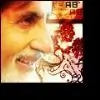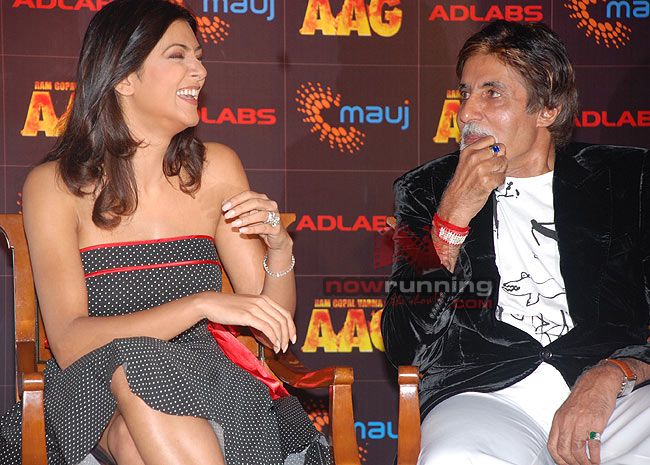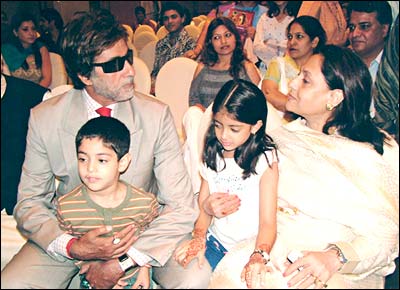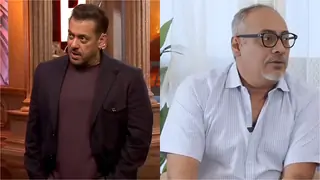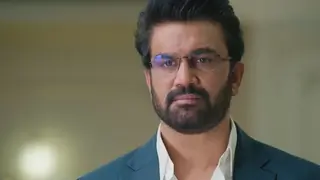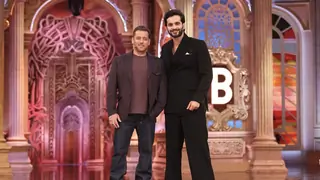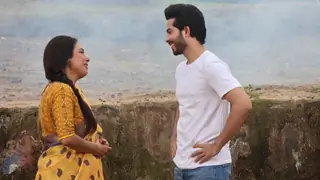'We as a family have seen virtual bankruptcy. We are scared, so we want to work till we can'
SHEKHAR GUPTA: We believe in the scientific truth and we as a paper, at the Express group, never reported the manglik business (before Abhishek Bachchan's marriage to Ashwarya Rai).
AMITABH BACHCHAN: If you as a paper never believed in reporting it, was any attempt made by the paper to express what you just said?
SHEKHAR GUPTA: We did publish a commentary on the reportage. We have a column on TV programmes and did a story on a certain TV show that disbanded its popular sex-counselling show to show the Abhishek-Ash wedding and the temple trips. So we do take a stand on issues, yes. But would you then agree with Tony Blair when he called the British media a "feral beast" and that applies to the Indian media as well? Have you heard about it?
I heard about it and I thought this guy had had it. No, I don't agree with him.
AMBREEN KHAN: With everything that you said, are you saying that you're not superstitious at all?
I may be superstitious. But if I practise it at home, I don't think it should bother anybody at all. But if you insinuate that going to a temple is superstition, then you'll have to stop the entire country from going to temples.
VANDITA MISHRA: At a time when your considerable talent would have made a difference to the small cinema movement, you were in very few of these films. At the time, it would have mattered if you lent yourself to them. You didn't. Today, you are experimenting and doing all sorts of roles. But then everybody is experimenting.
I didn't pay attention to what you call "small cinema" as much as I should have. We tend to associate ourselves to projects we feel are going to be good at the box office. We suffer from a tremendous fear of failure. Every Friday is an examination for us. How will we fare? In case we do work for an "Art" film, will the Manmohan Desai cast me again? Will Salim-Javed write another script keeping me in mind? Will Prakash Mehra take me?
Today, because I am no longer the leading man, the onus of the success or failure of the film doesn't rest on my shoulders. People now come to see a Shah Rukh Khan, Hrithik Roshan or a Salman Khan. I can have the liberty of experimenting now.
NAMRATA SHARMA ZAKARIA: I grew up watching Manmohan Desai's Amitabh Bachchan. Now you're doing irreverent films like Black and Cheeni Kum. Which phase did you enjoy more, which is closer to your heart?
I'd like to believe everything I've done is close to my heart. Not just different subjects. I've had the fortune of working with three to four generations of colleagues and directors — from Hrishikesh Mukherjee, Salim-Javed, Manmohan Desai, Prakash Mehra, Yash Chopra, Mukul Anand, Tinnu Anand, Aditya Chopra and Karan Johar. To be honest, each generation will have different views.You admire Shah Rukh Khan and I admired Dilip Kumar and Waheeda Rehman. No one knows who will be the idols in the next 10 or 12 years. And the audience of tomorrow would look at us in a lesser degree as opposed to the current generation. I once reprimanded Abhishek because he questioned Dilip saab's performance and then when he questioned Waheedaji's performance. They are very dear to me as performers. But definitely doing Agneepath, Khuda Gawah and working with Karan Johar, Aditya Chopra and Sanjay Leela Bhansali were great phases.
HARNEET SINGH: Who is your biggest critic and whose praise matters the most to you?
My wife.
ROSHMILLA BHATTACHARYA: Everyone is talking about how Indian cinema has made a place for itself. But how would you react to the fact that our films have never made it to the competitive section abroad?
You'd have to ask Aamir Khan about that. But I think they have a vigorous procedure for selection and have very fine guidelines about what they call entertainment. I agree that a lot of our films that are very radical need to be showcased. I was at the premiere of Cheeni Kum at Cannes this year and I saw how elaborate the system was there. There is a glut of small-budget and blockbuster films, but many good films go unnoticed.
SOURAV MAJUMDAR: Your company, ABCL, in the late 90s set the trend of corporate management in the film world. But it did not do well. Are you out of the red now?
ABCL is out of the red now. At the last AGM, I was able to declare a dividend for the first time in eight years. I regret we haven't been able to compete with others, who came after us and went far ahead. I believe we had a brilliant vision, which was probably a little ahead of its time. We were all creative people. None of us were "managers". The freedom we gave and the talent we hired ended in the Miss World competition. That was a big disaster. We were left with only one individual — the finance officer, who is still with us. And we haven't dared to expand beyond that. We still continue to make profits. Whatever I earn through endorsements, television, concerts and audio goes to my company to pay off everybody. But closing it was never an option. I felt something that bears my father's name should never be declared bankrupt.
SHANTANU DATTA: I want to ask you about two of your films: Shatranj Ke Khiladi with Satyajit Ray for which you did the voice-over and Agneepath where you experimented by changing your voice and won a National Award.
The entire world wanted to work with Satyajit Ray. When he came with the concept of doing a voice-over, I accepted it happily. Unfortunately, he had left his assistant director in charge of the Hindi dialogue. But I'm so happy that I can somehow say I've worked with Ray.
Agneepath was delightful. I'm happy to say that I had somewhat initiated the craft that today's generation of moviemakers are taking onto. Mukul Anand and others are responsible for what today's generation is doing. They came from the ad world. They have a magical eye. The way they constructed their frames, the way they shot their films. Prakash Mehra was a great storyteller. And as long as his story was enacted in front of the camera, he was framing his next shot. And with every new shot he would change the lens. That time there was no fuss about camera work or changing lenses. But look at the generation today. It's amazing how they structure their films. When I met Adi Chopra for his film, the first thing he said was: "Uncle, the publicity of the film will be done like this". I said, "Yeah fine, but, what is the story?"
From K Asif, Bimal Roy to Guru Dutt, their frames were so brilliantly shot. I remember we weren't allowed in the editing room of Hrishida. We would beg him to have a look at the screen and he wouldn't.
SHEKHAR GUPTA: Even Bal Thackeray saw Sarkar and commented: "Whatever said and done, he (Amitabh) imitated me so well. He lifted his arm up just the way I would."
How else is an arm lifted but like that (gesturing). Ram Gopal Verma showed him the film.
DEEPA KARMALKAR: I'd like to know about your reactions to Sivaji?
I've seen it. I thought every frame reminded me of Manmohan Desai's cinema. And Rajnikant's capacity as an actor to make the ordinary look so extraordinary is admirable.
VANDITA MISHRA: I want to ask you about your drunken scenes. How did you prepare for them, since it is believed you're a teetotaller?
I used to drink but I gave it up 40 years ago.
CHANDRASHEKHAR BOBDE: Have you ever thought of putting your talent to a serious social issue?
I should accept that I haven't done so in the past. But I'm not really a social worker. I am an artist and I want to be an artist. I fear that if I take a stance, it could take a political colour.
SHWETA DESAI: Do you regret films like Lal Badshah and Suryavansham?
I never regret anything. I know that some things work in life and some don't. I used to ask my father during his last years, whether he suffers from doubt. I told him, "Bahut sangharsh hai". And he said, "Jab tak jeevan hai, tab tak sangharsh hai."
SHWETA DESAI: Any roles you would've loved to do or people you would've like to work with?
I would've loved to work with Dilipsaab. Then films of Guru Dutt like Kagaz Ke Phool.
FARAH BARIA: Why do you think you are a cult figure?
It's the medium. It's larger than life. You see your idol. He seems 40 feet tall, woos beautiful women and lives up to all things correct in the society. It's mass hysteria. I didn't know I'd ever be an actor. We grew up watching Ramleela. I'm still stuck in that era.
BHAWANA SOMAAYA: There is so much pressure on Rajnikant as a star to perform and keep his huge number of fans happy. Do you ever feel that?
That is a constant fear with all actors. What am I going to do when after the biggest hit has been given? We all reach a point on the top and then the pressure to write something bigger than Salim-Javed's or Prakash Mehra's last frame comes. It is the same with Rajnikant.
O P THOMAS: You boycotted the press at one point.
There were several misconceptions during the Emergency. I was known to the Gandhis and there was a feeling that I was responsible for the ban on the newspapers. I had nothing to do with it. There was a huge outcry and the press boycotted me. My name was removed from the credit titles of films. It was a bad time. But then everything cooled down and went back to the way they were initially.
SHEKHAR GUPTA: Will there ever be Memoirs of Amitabh Bachchan?
Well, I can't write. I am completely incapable of that. So, I'll keep on acting till I can. We, as a family, have seen great depression and virtual bankruptcy in our time. We are scared as we fear: will those times be upon us once again? So we want to go on working till we can.


